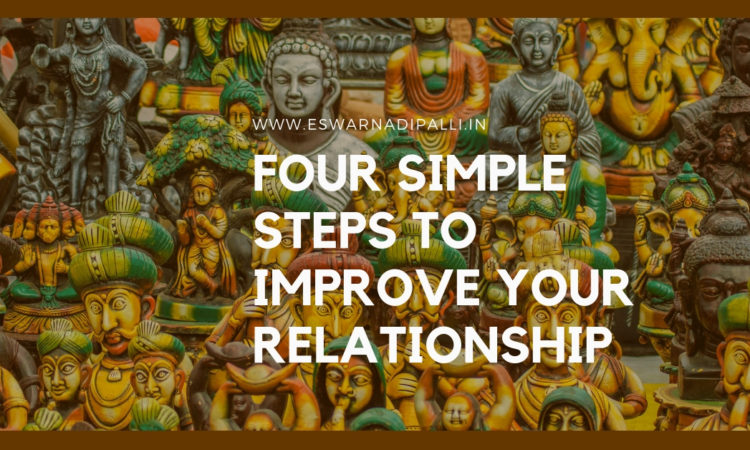The rooms left uncleaned, books, toys, pencils, lay scattered, the huge TV screen alive playing a movie with muted sound, a pile of dishes holding the remnants of spoiled food wilting in the sink. Lakshmi is staring at one more day where nothing seems going right for her.
‘Why I’m never happy’ she questions herself as many times as she surveys the silence surrounding her.
‘It has been ten years, and I can’t take it anymore,’ the umpteenth time she blamed herself for her unhappy status.
Lakshmi in her late thirties is one who loved all good things in life, looked for affinity from friends, and fiercely independent. She, married ten years ago, well-placed dollars earning husband, and has two kids. For the reason that baffles everyone, she never fits in to be a part of a safe, happy family life together.
‘Some people never outgrow from their childhoods,’ it’s like a part of them never seem to adjust to household ordeals. They are like that; no amount of compassion is enough to satisfy her ever-expanding need to excite herself. That’s where her problem lies. She found monotony in each day, flat and drained all the time.
I have to admit, as her father: a whole time optimist, where bad or worse nothing prevents me from making everything bids in my favor. Having courted hopefulness for decades guiding my daughter Lakshmi has become the toughest challenges of my existence.
One hesitation, as an educator, counselor, and trainer, when I want to share anything a grip of indecision holds me. I wouldn’t want to share the simple smartness of happy togetherness for one reason that I find many hide behind a layer of unwillingness not to listen honestly. They imagine the gem of good things that teach happiness is a job of high and mighty swamis’ but not ordinary souls like me.
Lakshmi is no immune to this errant devotion of “I fashion my delusions, and fears,” the kind of mental scraps and a lot of negatives believing someone out there is the source of her unhappiness. Too biased to assume, ‘I could find none good enough to rescue me.’
One night she called and asked one question that took me by surprise, ‘daddy, why don’t you coach me something, to motivate, the ‘how to’ weed out my negativity and look for happiness and joy in my everyday life’?
I raised my voice into my phone and let out an hour-long sermon on the subject I loved most – the good relationships.
Here is the first lesson: to have a close relationship with your worth, don’t allow other people to attach a cheap price tag on you.
We speak of many affairs, but it never occurs to us the wisest affairs we need to go out with is a ‘love affair with ourselves.’ It roughly means placing enormous value on ourselves, our self-respect, our time, our energies, how much we are concerned about us as a being.
For a happy living, to fulfill many of our desires knowing about ourselves is essential. Before we expect others to care about us, we must have self-understanding of what we are, our strengths, our imperfections, and the awareness which puts us in an angle where others could see our real self.
In marriage or our life we are primarily responsible for our wellbeing; for it is only what we have, we can give to another. It goes like this if we are gloomy, invisible, ineffective, victimized, how we can give our partner sunshine, clarity, success, and security. It requires a constant awareness of self to save our home and our marriage. A quality we have to learn, develop and apply every single day.
Here is the second lesson: don’t let the petty language of complaining enter your relationship.
Let’s consider the question, how long could I stand myself, if I were living with me? Do I enjoy the experience of being myself, do I take time to look at as others close to me do.
Intimately if we dissect the question, we would never see, or more purposefully have never seen ourselves in the action arena of a daily play of life. We wouldn’t opt willing to set, mostly, to such scrutiny because many of us, so viewed, would probably find shockingly different from what we presume to be.
If we stand facing the mirror of the self-examination, do we find, ‘complaining, demanding, thoughtless, fault-finding, insensitive, unkind, irritating, bossy, showing little respect to others, blaming, ridiculing, of a little warmth, mean, disliked’ type of character. But wish others to take us as the most caring, obliging persons.
Or do we boldly face it and loudly claim, I’m the most considerate, warm, loving, accepting person, good and honest? Let’s face the truth; knowing who we are, good or bad; frankly, is one attribute for healthy relationships.
In healthy relationships, the fact is its not big problems that cause huge cracks in a relationship. It’s a series of small knocks over a long period – strokes like harsh comments, long gaps of silence, insensitive remarks, and hostile body language. I guess none of these behaviors is sharp enough, forceful enough to destroy a relationship. But overwhelmed by egoistic factors, allowed to continue to grow and ferment and irritate any relationship that is strong and secure enough could gradually bite the dust.
Relationships fail not because we are wrong, but many of us don’t want to correct the mindset. They never want to come out of their comfort zones; stuck to their tads of ego, at the end they want their way.
Here is the third lesson: don’t dominate and influence your partner to change.
There is a miracle word in management, called, ‘the synergy.’ We can produce something greater than the two of us. When we put our heads together to identify a problem and all possible solutions as a team, we can expect spectacular results.
When we are part of a team, there is no space for two words, “Dominance and change.” We can never change a person without their consent. For a relationship to survive, we have to respect their individuality and choices they make. Closeness comes in a relationship when we recognize and protect the attitudes, feelings, and rights of both partners.
A good relationship gets derailed when we try to change others for our convenience. In our eagerness, we manipulate in many ways, impose guilt, anything which makes our partner into a type of personality we think good for us. We do it in the name of love, in the name of family wellness, claim it is best for the other.
If we desire to form a lasting relationship, ask for continuing happiness, it must gratify us with everything that our partner is – his real self. We could consider it luck if the other person changed to accommodate our needs.
‘In my marriage, I took responsibility to be thoughtful of my wife’s state of mind. I’m the one who is ready to sacrifice a part of the joy for my family. I took pleasure in adapting to the needs of family members; I saw them relaxed and secure. I allowed them the dignity, space, and pleasure to live in mutually adjustable environs’.
But this requires real maturity. Good relations never prosper if we adhere to the doctrine, ‘I’m always right,’ and asserting that the fault always lies with the other person. In marriage, there is one path of both, the bumpy, difficult but always the mutual path.
Here is the fourth lesson: don’t blame others for your failures.
In marriage or a relationship, we are solely responsible for our happiness or despair. And the sooner we realize, and accept that fact, and follow it earnestly, and bring it into our daily life; I assure a promise: peace, creativity, and happiness will be yours.
Ignoring the fact, we live, keeping ever, the habit of blaming others, for our feelings, actions, and our results.
We blame parents for lack of financial support, lack of love, nurturing. We blame society for lost opportunities. We blame friends, lovers, teachers, even god, and life. The comfort we enjoy in blaming and passing the buck for our deficiencies has one advantage. It prevents us the necessity to change or change our attitude towards the better. Live in the consolation of self-pity in a monochrome of unaltered, victim-mentality life.
Relationships are no dumping grounds for our weaknesses, selfishness, egocentricity, despair, and anger. We only grow and accommodate others in our happiness only when we assume responsibility for our future and success. It doesn’t have to do with any outside influence. Its sooner the better when we realize the blessings of the day and peace comes from within.
Happiness and true freedom come when we assume full responsibility for what we are. Enjoyment is the best in our life when we own our problems and don’t blame them on anyone else.
The pleasure and peace lay in holding the four pieces of the lessons ‘give and take’ advice in your uppermost mind. When you linger an extra time under a shower or stand a minute more at the mirror and see worry reflected, or you stare at the stale breakfast. It’s time to allow the four lessons to speak for quick readjusting of your feelings, prejudices, and creating the desired calmness in your thoughts, allowing you innate abilities to recover and nourished. They should act as mental breaks to the negative talk and train you to take a healing path. You chant them daily in every breath; make them familiar to your thinking pattern. I wish it would gift you the receptivity of new mindfulness that would enliven you to bargain the daily warmth of hope, safety, and happiness.

